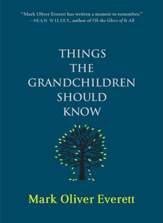 In the 36,393 tracks that Last.fm has listened to me play since I originally signed up for the service four years ago yesterday, the Eels are the second most frequently played act. A distant second to Pearl Jam, it’s true, but still: to be the second most frequently played act in better than 35,000 selections has to count for something.
In the 36,393 tracks that Last.fm has listened to me play since I originally signed up for the service four years ago yesterday, the Eels are the second most frequently played act. A distant second to Pearl Jam, it’s true, but still: to be the second most frequently played act in better than 35,000 selections has to count for something.
I mention this because it might have bearing, as everything that follows is a commentary on the memoir recently published by the band’s lead singer, one Mark Oliver Everett, better known in some quarters as Mr. E, or just plain E. We’re big on disclosure around here, obviously, so should you choose to discount this review because you suspect I’m biased, well, I won’t hold it against you.
Promise.
Mark Oliver Everett, besides being the frontman for my second favorite band, is the son of Hugh Everett III, a theoretical physicist of some reknown. The originator of the Many Worlds interpretation of quantum mechanics (don’t ask me to explain it: as Niels Bohr said, “If quantum mechanics hasn’t profoundly shocked you, you haven’t understood it yet”), Everett the elder’s brilliance in his field of choice was, unfortunately, considerably offset by his deficiencies as a parent. And while his mother tried, the reality was that Everett the younger’s childhood was nasty, brutish and short.
Nor did things materially improve as time passed. His sister loving, but troubled and schizophenic, bounced from bad situation to bad situation, eventually dying by her own hand in 1996. To be followed shortly thereafter by his mother, who was felled by lung cancer in 1998. Which left Everett – fragile himself – the family’s improbable sole surivor.
Things the Grandchildren Should Know is at once his effort to document – in a modest, self-deprecating fashion – this arc and, I would argue, forgive his parents in the process. As a work of literature, it leaves something to be desired. As a triumph over circumstance, and an act of redemption, it’s profoundly moving.
As family histories go, Everett’s is tragic. Well this side of, say, Mikal Gilmore‘s, as chronicled in his brutal work, Shot in the Heart, but tragic nonetheless. Like Eggers‘ manic magnum opus, A Heartbreaking Work of Staggering Genius, Things the Grandchildren Should Know tells the story of an artist robbed of even an average upbringing. But unlike that Eggers’ work – despite its brilliance – Everett’s own memoir is unrelentingly unpretentious and self-effacing.
While Everett’s prose cannot be compared to Eggers’, Things the Grandchildren Should Know resonated far more deeply with me in part because of its innate comprehension that pain and loss are merely the flip side of the coin that buys happiness and life. Tragedy may marked long stretches of Everett’s life, but he was successful in not allowing it to define him, or worse, sink him. Unlike some of his contemporaries – Elliot Smith most notably – Everett had just enough armor to transcend his scattered childhood and absent family to become one of the more successful, and yet independent, acts going. Not to mention one of my favorites.
Though it’s downplayed, Everett’s ability to see the silver lining is impressive: all the more so given his history. At times, as the Amazon review notes, the book is borderline mundane in its recitation of tour details, but the thread is never lost amidst the anecdotes of a touring artist. Nor is it self-indulgent; it’s an act of catharsis for the author, clearly, but readers are likely to find it as accessible and as important.
Still, the most touching aspect of the memoir might not be his ability to impart the unsourced optimism that ultimately eclipses his loneliness, but his capacity for forgiveness. While many of us will let the mistakes of the past poison the present, Everett successfully came to terms with his parents’ flaws, and Things the Grandchildren Should Know is as much an act of forgiveness as McCourt‘s Angela’s Ashes or O’Neill‘s Long Day’s Journey Into Night.
Don’t read Things the Grandchildren Should Know for the quality of the writing – Everett, in my view, is a better songwriter than he is an author – but do read it if you’d like to have your faith in humanity renewed. That Everett emerged from his childhood at all is playing with house money, that he can say that he’d do it all it again is singularly unique, in my experience.

David Comay says:
December 4, 2008 at 5:15 pm
Great post, Stephen. By the way, did you happen to catch the Nova documentary on Hugh Everett III called “Parallel Worlds, Parallel Lives”. Sadly, I missed it when it aired but it sounded really interesting. The San Francisco Chronicle had an article about it
http://www.sfgate.com/cgi-bin/article.cgi?f=/c/a/2008/10/20/DD1O13KK2P.DTL
Also, was that “eperience” at the end intentional? 🙂
sogrady says:
December 4, 2008 at 5:19 pm
@David Comay: no, sadly i have yet to catch that, though i’ve been aware of it for a little while.
as for the “eperience,” no, just another egregious typo. thx for the pointer 😉
Rob Curran says:
December 11, 2008 at 5:40 pm
To echo David, this was a great post.
I did catch the Nova special and it’s worth keeping an eye out for repeat-wise. Although I’ll admit I came away more intrigued by E than parallel worlds.